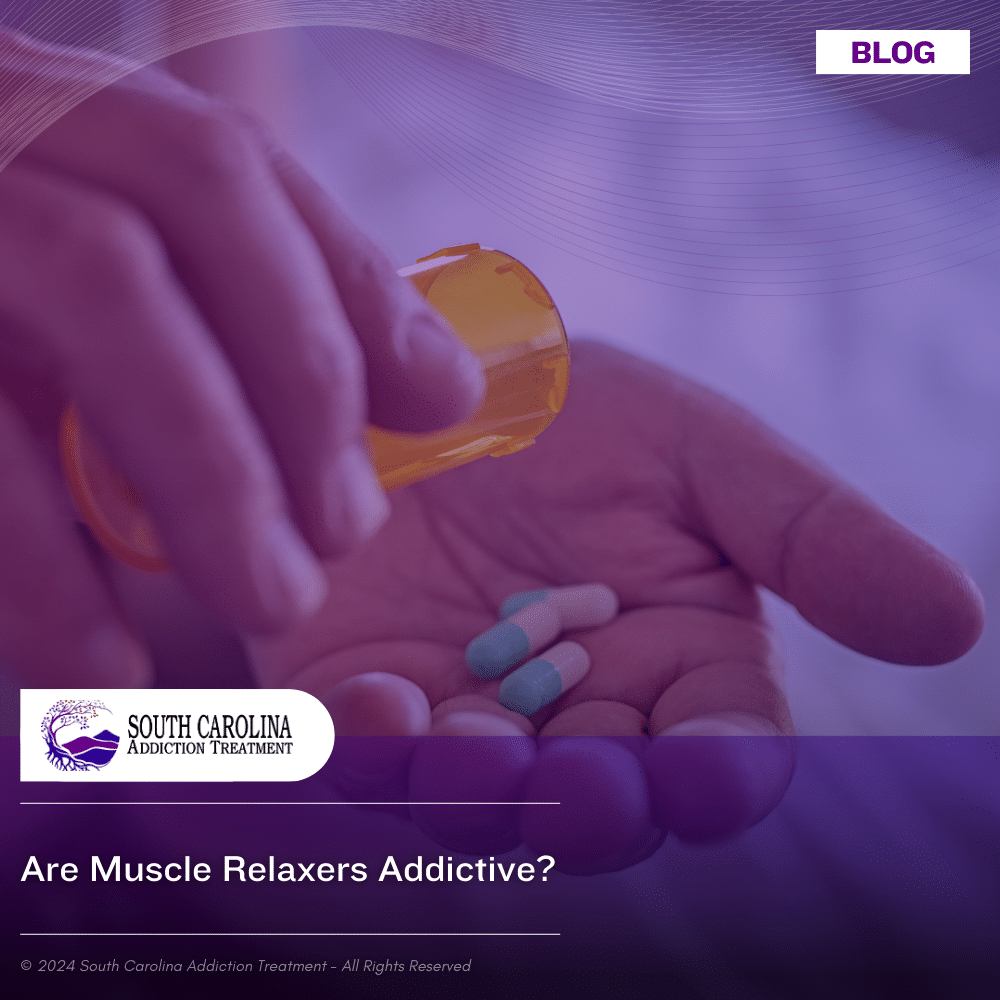Are Muscle Relaxers Addictive?

Medically Verified: 2/1/24
Medical Reviewer
Chief Editor

All of the information on this page has been reviewed and verified by a certified addiction professional.
Muscle relaxers are prescription medications used to relax the muscles in individuals who are experiencing some type of muscle pain. For example, muscle relaxers may be prescribed for muscle pain, spasms, back pain, or even neurological disorders. While these substances can provide much-needed relief for muscle pain, they are also known to be habit-forming.
Many different types of muscle relaxers are used to treat pain and spasms. Unfortunately, each one of these medications can lead to dependency and addiction. According to the U.S. Department of Justice, 2,276,000 people aged 12 or older misused Soma (a prescription muscle relaxer).[1]
What are Muscle Relaxers?
Muscle relaxers or muscle relaxants are prescription medications used to improve muscle function. These medications might be prescribed to treat a variety of symptoms, including muscle pain, spasms, and spasticity.
Muscle relaxers can be divided into two subcategories: antispastics and antispasmodics. These two subcategories differ in the way they are used and the side effects they may cause.
Antispasmodic muscle relaxers are used to treat lower back pain and muscle spasms. On the other hand, antispastics are used to treat spasticity, a disruption in muscle movement that causes them to contract when you attempt to move or rest.
The antispasmodic muscle relaxers include:
- Carisoprodol (Soma)
- Chlorzoxazone (Lorzone)
- Cyclobenzaprine (Flexeril)
- Metaxalone (Skelaxin)
- Methocarbamol (Robaxin)
- Orphenadrine (Norflex)
The antispastic muscle relaxers include:
- Baclofen (Lioresal)
- Dantrolene (Dantrium)
Two medications contain both antispastic and antispasmodic properties. These medications include tizanidine (Zanaflex) and diazepam (Valium).
Are Muscle Relaxers Addictive?
People may begin to abuse muscle relaxers because they can cause intoxicating effects like euphoria and calmness. Certain muscle relaxers like tizanidine and baclofen are known to be central nervous system depressants, which are commonly abused because of the side effects they can cause. Additionally, many people mix their muscle relaxers with other drugs like opioids to create a more potent high.
According to the National Library of Medicine, “Although skeletal muscle relaxants are occasionally the primary drug of abuse, they are often used along with other central nervous system depressants, such as narcotics or alcohol.”[2]
Muscle relaxers can be addictive, so anyone taking muscle relaxant medications should be careful not to take more than they are prescribed. Also, taking muscle relaxers long-term can lead to dependency.
What are the Dangers of Muscle Relaxer Abuse?
If you or a loved one are addicted to muscle relaxers, you are at risk of experiencing an array of adverse side effects. First, many people who abuse these substances take them in extremely high doses or alongside other central nervous system depressants like opioids and alcohol. Doing so could cause you to experience a life-threatening overdose.
Other dangers of abusing muscle relaxants include:[3]
- Frequent drowsiness or sedation
- Fatigue and weakening of muscles
- Depression
- Decreased blood pressure
- Irregular heartbeat
- Seizures
- Disorientation or psychosis
- Anxiety
- Inflammation or swelling of the liver
- Low white blood cell count
- Paralysis
- Coma
- Death
Because long-term muscle relaxant abuse can lead to life-threatening side effects, anyone misusing these substances should seek professional drug addiction treatment.
Spotting the Signs of Muscle Relaxer Addiction
If you are worried that a loved one is abusing muscle relaxers, it’s important to be aware of the signs of addiction. People abusing these drugs may run out of their prescriptions early on or visit multiple doctors to receive more than one prescription at a time.
Other signs of muscle relaxer addiction include:
- Needing a larger dose to experience the desired effect
- Changes in appetite and sleeping habits
- Borrowing or stealing money to obtain more muscle relaxants
- Losing interest in previously enjoyed activities
- Isolating from friends and family
- Having a desire to quit using muscle relaxers but being unable to
- Continuing to use muscle relaxants when you do not need them anymore
- Experiencing withdrawal symptoms when the medication wears off
- Faking back pain or injuries to receive more prescriptions
- Mixing muscle relaxants with other substances like alcohol or opioids
- Experiencing uncontrollable urges or cravings to use muscle relaxers
Find Help for Muscle Relaxer Abuse and Addiction
If you or a loved one frequently misuse muscle relaxers, it’s time to consider attending a drug rehab program. Many people believe the misconception that abusing muscle relaxants is safe because they come from a doctor. Unfortunately, long-term abuse of these substances can lead to a variety of life-threatening health effects.
To learn more about our treatment programs, contact South Carolina Addiction Treatment Center today.
References:
- The U.S. Department of Justice (DOJ): Soma Fast Facts, Retrieved July 2023 From https://www.justice.gov/archive/ndic/pubs10/10913/10913p.pdf
- The National Library of Medicine: Abuse of skeletal muscle relaxants, Retrieved July 2023 From https://pubmed.ncbi.nlm.nih.gov/1927837/
- The National Library of Medicine: Considerations for the Appropriate Use of Skeletal Muscle Relaxants for the Management Of Acute Low Back Pain, Retrieved July 2023 From https://www.ncbi.nlm.nih.gov/pmc/articles/PMC4103716/

